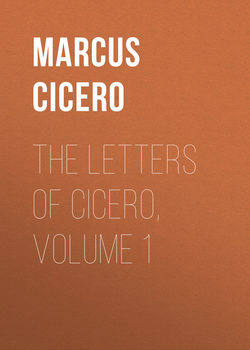Читать книгу The Letters of Cicero, Volume 1 - Марк Туллий Цицерон, Marcus Cicero - Страница 30
CICERO'S LETTERS
XXVIII (a ii, 3)
ОглавлениеTO ATTICUS (ON HIS WAY TO ROME)
Rome (December)
b.c. 60, æt. 46
First, I have good news for you, as I think. Valerius has been acquitted. Hortensius was his counsel. The verdict is thought to have been a favour to Aulus's son; and "Epicrates,"173 I suspect, has been up to some mischief. I didn't like his boots and his white leggings.174 What it is I shall know when you arrive. When you find fault with the narrow windows, let me tell you that you are criticising the Cyropædeia.175 For when I made the same remark, Cyrus used to answer that the views of the gardens through broad lights were not so pleasant. For let α be the eye, βγ the object seen, δ and ε the rays … you see the rest.176 For if sight resulted from the impact of images,177 the images would be in great difficulties with a narrow entrance: but, as it is, that "effusion" of rays gets on quite nicely. If you have any other fault to find you won't get off without an answer, unless it is something that can be put right without expense.
I now come to January and my "political attitude," in which, after the manner of the Socratics, I shall put the two sides; at the end, however, as they were wont to do, the one which I approve. It is, indeed, a matter for profound reflexion. For I must either firmly oppose the agrarian law—which will involve a certain struggle, but a struggle full of glory—or I must remain altogether passive, which is about equivalent to retiring to Solonium178 or Antium; or, lastly, I must actually assist the bill, which I am told Cæsar fully expects from me without any doubt. For Cornelius has been with me (I mean Cornelius Balbus,179 Cæsar's intimate), and solemnly assured me that he meant to avail himself of my advice and Pompey's in everything, and intended to endeavour to reconcile Crassus with Pompey.180 In this last course there are the following advantages: a very close union with Pompey, and, if I choose, with Cæsar also; a reconciliation with my political enemies, peace with the common herd, ease for my old age. But the conclusion of the third book of my own poem has a strong hold on me:
"Meanwhile the tenor of thy youth's first spring,
Which still as consul thou with all thy soul
And all thy manhood heldest, see thou keep,
And swell the chorus of all good men's praise."181
These verses Calliope herself dictated to me in that book, which contains much written in an "aristocratic" spirit, and I cannot, therefore, doubt that I shall always hold that
"The best of omens is our country's cause."182
But let us reserve all this for our walks during the Compitalia183. Remember the day before the Compitalia. I will order the bath to be heated, and Terentia is going to invite Pomponia. We will add your mother to the party. Please bring me Theophrastus de Ambitione from my brother's library.
173
"The Conqueror," i.e., Pompey. Aulus's son is L. Afranius.
174
I.e., his military get-up.
175
Cyrus was Cicero's architect; his argument or theory he calls Cyropædeia, after Xenophon's book.
176
He supposes himself to be making a mathematical figure in optics:
177
The theory of sight held by Democritus, denounced as unphilosophical by Plutarch (Timoleon, Introd.).
178
Apparently a villa in the Solonius ager, near Lanuvium.
179
The Cornelius Balbus of Gades, whose citizenship Cicero defended b.c. 56 (consul b.c. 40). He was Cæsar's close friend and agent.
180
Cicero was apparently not behind the scenes. The coalition with Pompey certainly, and with Crassus probably, had been already made and the terms agreed upon soon after the elections. If Cicero afterwards discovered this it must have shewn him how little he could trust Pompey's show of friendship and Cæsar's candour. Cæsar desired Cicero's private friendship and public acquiescence, but was prepared to do without them.
181
From Cicero's Latin poem on his consulship.
182
εἶς οἰωνός ἄριστος ἀμύνεσθαι περὶ πάτρης (Hom. Il. xii. 243).
183
A country festival and general holiday. It was a feriæ conceptivæ, and therefore the exact day varied. But it was about the end of the year or beginning of the new year (in Pis. § 4; Aul. Gell. x. 24; Macrob. Sat. i. 4; ad Att. vii. 5; vii. 7, § 2).
